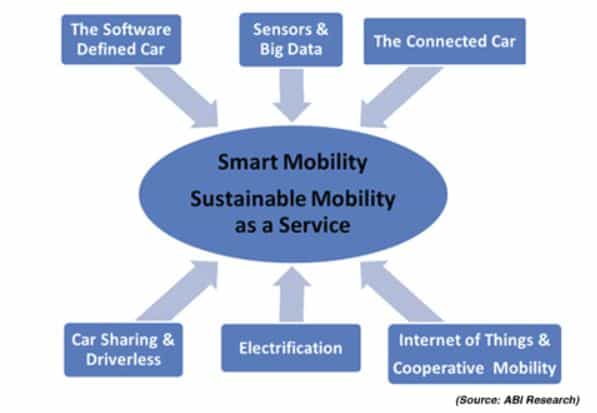 The automotive industry will undergo six transformative paradigms over the next 25 years to prepare for a future of smart, sustainable mobility. ABI Research, the leader in transformative technology innovation market intelligence, defines the six stages as the software-defined car, sensors and big data, the connected car, cooperative mobility and the IoT, electrification, and car sharing/driverless cars. While the first three phases are already underway, the latter three will start to drive the market forward within the next 10 years.
The automotive industry will undergo six transformative paradigms over the next 25 years to prepare for a future of smart, sustainable mobility. ABI Research, the leader in transformative technology innovation market intelligence, defines the six stages as the software-defined car, sensors and big data, the connected car, cooperative mobility and the IoT, electrification, and car sharing/driverless cars. While the first three phases are already underway, the latter three will start to drive the market forward within the next 10 years.
Car manufacturers are currently revamping vehicles’ electronics and networking architecture to ensure every sub-system is connected and software-defined. Moving toward the next decade, the automotive industry will achieve cooperative mobility. Cars will communicate with not only each other but also infrastructures and environments. Electrification will then change the way consumers power their vehicles. And, lastly, car sharing and driverless cars will likely lead to market consolidation.
“The final three stages—cooperative mobility, electrification, and car sharing leading to driverless cars—will be the most disruptive to the automotive industry,” says Dominique Bonte, Managing Director and Vice President at ABI Research. “Not all car manufacturers will survive the changing landscape. And newcomers will also emerge, ones eager to create new, software-defined, high-tech cars.”
Through this industry fluctuation, there will be a number of opportunities for manufacturers and vendors to reinvent themselves. Gas stations will need to rethink their market strategy and offer new services, such as electric charging stations, or risk losing their relevance completely. Taxi companies are already feeling the rising pressure, meeting stiff competition from Uber and other new car sharing services. Dealerships and insurance vendors also face potential upset. Semiconductors and software companies, on the other hand, have a huge future, as cars continue to incorporate more sensors and computing technologies into their architectures.
“Think beyond smart, sustainable mobility, and soon we may witness a new trend that links smart mobility to virtualized lifestyles,” concludes Bonte. “As people start engaging in more virtual reality experiences at home, will there be as strong a need for road transportation? It’s a far look into the future but a scenario that could definitely send the automotive industry into a tailspin.”
These findings are part of ABI Research’s Automotive Safety and Autonomous Driving Service, which includes research reports, market data, insights, and competitive assessments.